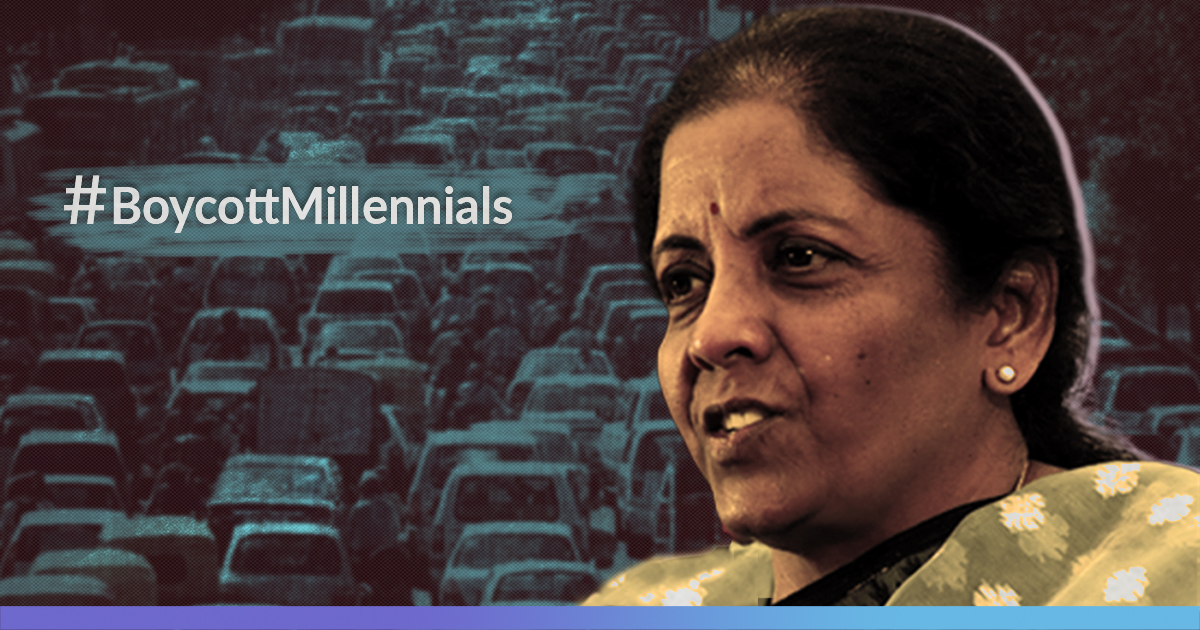Finance Minister Nirmala Sitharaman on Monday, September 10 said that millennial mindset of preferring cab services or metros is one of the reasons for auto sector slowdown. The comment has upset the millennials.
Her comments attracted satirical criticism, with the #BoycottMillennials trending on Twitter. Thousands of tweets mocking the finance minister’s statement were put out in a matter of 24 hours.
What @nsitharaman actually said:
Automobile sectors is affected by several factors- BS VI movement, registration fee related matter which we have deferred till June, some ‘studies tell’ that millenials are preferring Ola-Uber over buying cars. We are trying to solve them. @ANI pic.twitter.com/bMh5LqJphx
— Nirmala Sitharaman Fan (@nsitharamanfan) September 11, 2019
Even though Sitharaman said that some ‘research studies’ say that the gen-next prefers Ola and Uber, she did not refer to any specific study conducted at any institute or a university. So which research was she quoting?
Even if the finance minister is to be believed, then Ola and Uber should be in a good position in the Indian market. But as per a The Hindu Business Line report, the cab operators are facing challenges from upcoming sharing ride apps like GetToWork and rPool which offer the same ride at a cheaper price.
Sitharaman further said that people opt for Metro rather than committing to buy a car on EMI. Her statement is logical and a harsh reality as well. If a person has an option of a comfortable metro ride at much cheaper rates, then buying a car and maintaining it doesn’t make sense. Especially when the fuel prices are skyrocketing. But isn’t it a good sign that people are using public transport?
Remember, the sale of passenger cars is not the sole reason for the whole auto sector slowdown as mentioned by the finance minister. As per a Business Standard report, total sales of India’s top four M&HCV makers — Tata Motors, Ashok Leyland, Volvo Eicher, and Mahindra & Mahindra — fell by 59.5 per cent to 31,067 units during August 2019, compared with the period a year ago. Commercial vehicles are used for the transport of various goods, from food grains to automobiles. So even if the passenger auto sales are down because of Ola and Uber, what is leading to the slowdown in commercial vehicle sales?
The iconic Parle-G factory was shut down in July this year after operating for 87 years. The company cited low productivity as the reason for the shutdown. The company is also expected to lay off around 10000 employees due to the current prevailing situation.
The similar situation also extends to cosmetic and healthcare conglomerate Emami. “We are doing some cost optimization,” Priti A. Sureka, a director at Emami said in an interview to Live Mint.
Is cutting down on basic products such as biscuits and hair oil also a millennial mindset? If no, then why are these sectors suffering? If yes then it poses a bigger question before the government as to why are millennials not consuming? The finance minister has a lot to answer.
Also Read: Caught In Debt Trap For Decades, Four Generations Of A Family Commit Suicide In Punjab











